Five ‘Young World Tech Innovators to Watch
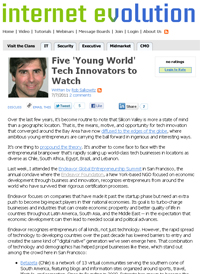 Over the last few years, it’s become routine to note that Silicon Valley is more a state of mind than a geographic location…
Over the last few years, it’s become routine to note that Silicon Valley is more a state of mind than a geographic location…
 Over the last few years, it’s become routine to note that Silicon Valley is more a state of mind than a geographic location…
Over the last few years, it’s become routine to note that Silicon Valley is more a state of mind than a geographic location…
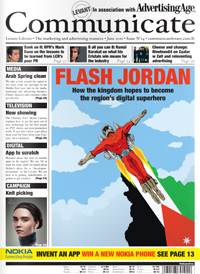 The mysterious campaign launched mid-April by creative agency Nineteen84 for restaurant chain Zaatar w Zeit finally came to a conclusion…
The mysterious campaign launched mid-April by creative agency Nineteen84 for restaurant chain Zaatar w Zeit finally came to a conclusion…
The time of year where one starts planning his or her respective vacations is upon us. Well, most of us. I am sure most of us, especially those of in the MENA region, find it especially challenging to find deals and flights, and ideas on where to go. Those in the travel industry seem to not have gotten the hang on Social Media, and just how useful and beneficial it could be for them.
 Spending most of our lives on the internet, and most of that time on Social Media Networks, a few questions come to mind as of late when trying to find someplace to go on vacation, the major one being: Where on earth ARE the travel companies, airlines, and Ministries of Tourism?
Spending most of our lives on the internet, and most of that time on Social Media Networks, a few questions come to mind as of late when trying to find someplace to go on vacation, the major one being: Where on earth ARE the travel companies, airlines, and Ministries of Tourism?
Imagine just how many potential customers a travel agency, be it an online agency or not, could reach just by having an online presence; constantly tweeting with followers, and updating their Facebook pages with travel information, or having contest and competition applications as incentive!
The same can be said for major airlines and Ministries of Tourism. They definitely need to jump on the bandwagon. Offering packages or deals to those social media addicts, the travel industry can tap into those frequent flyers and those business travellers that spend most of their nights in hotels. Two Swedish companies are already reaping the benefits of Social Media by actively answering questions from customers on their Facebook pages as well as using Twitter to distribute promotions.
There are a few good cases from the travel industry in Europe, which seems to be one of the industries that are most actively embracing social media. However, the MENA region could easily take note and promote their services even better, and more effectively. Don’t you think?
There is a lot of talk and discussion on the net about the pros and cons of Social Media. Needless to say there are various good points on both sides of the coin, and since Social Media is definitely here to stay, let’s have a look at a few of those.
In terms of communication, it seems as if the world has literally shrunk in size. We now (and have been for quite some time) are able to connect much faster with people all over the world. The lightning-fast power of social media has been of unprecedented help in times of crisis such as during the MENA uprisings, and earthquakes. In one incident in the US, a gunman went into a university, and students there were able to notify and warn each other via Facebook and Twitter before the University even knew. In that sense, Social Media has literally saved lives.
The other side of the coin is that in many cases, social media causes things to get lost in translation. False information can spread like the plague on Social Media networks. Anyone can post pretty much anything, from images, videos and all sorts of information. This results in major confusion, and in hurt reputations. (We don’t need to get into issues like leaked celebrity s– tapes and the sort to make this point now do we?) Moving on…
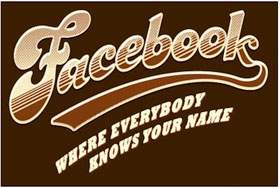 Regardless of the dangers, businesses and organizations are relying on Social Media now more than ever. In terms of advertising, I think we can all agree how lucrative it is, and how much more of a money saver it Is in terms of directly hitting the wanted demographic. Goodbye to Radio, TV and Newspaper advertising!
Regardless of the dangers, businesses and organizations are relying on Social Media now more than ever. In terms of advertising, I think we can all agree how lucrative it is, and how much more of a money saver it Is in terms of directly hitting the wanted demographic. Goodbye to Radio, TV and Newspaper advertising!
Businesses and consumers both benefit from the speed of Social Media. It allows both to get quick feedback on goods and services; another way of spreading that very important ‘word of mouth’ advertising. People looking for work can also use SM to find out more about potential employers, the same way that employers keep a lookout for potential employees nowadays. Employers keep a watchful eye over profiles on social networks, looking through pictures and posts. Some things you post could actually get you fired, so people beware!
Also, the amount of self promoting narcissists out there on Facebook and other social networks seems to have quadrupled!
Do you think social networks are a cause of people becoming a little too self-obsessed, always posting way too many pictures and ‘TMI’ (Too Much Information)?
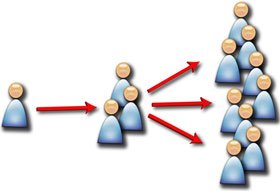 One question those of us in Social Media marketing agencies deal with on a constant basis the following: How do I make my YouTube video go viral?
One question those of us in Social Media marketing agencies deal with on a constant basis the following: How do I make my YouTube video go viral?
A concept still new to many in the region, and largely misunderstood by those creating ads, posting them online, and then not knowing how to generate this ‘viral buzz’. Content obviously plays a part of whether the video is searched for based on said content. If you want a truly viral video that will get millions of people to watch and share it, then yes, content is key. However, it is not THE main deal breaker. Some videos are just not funny enough (when meant to be funny) or attention grabbing. Others are just badly made. No matter how much money one spends on advertising via social media or other means, the video might get thousands of viewers, but it most certainly won’t be shared and thus, won’t go viral.
So, some important tips to keep in mind when planning a viral video are the following:
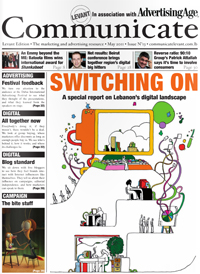 The digital revolution is shaking communication to the core. Where does Lebanon Stand?
The digital revolution is shaking communication to the core. Where does Lebanon Stand?
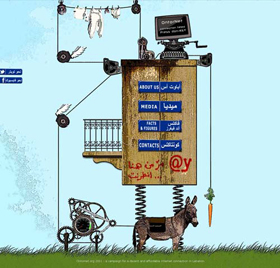 As of late, a couple organizations campaigning for faster internet in Lebanon have been birthed. One of them, Ontornet (a play on the Arabic ‘Ontor’, colloquial Lebanese Arabic for “wait for the net”), has already started to gather quite the buzz locally and internationally.
As of late, a couple organizations campaigning for faster internet in Lebanon have been birthed. One of them, Ontornet (a play on the Arabic ‘Ontor’, colloquial Lebanese Arabic for “wait for the net”), has already started to gather quite the buzz locally and internationally.
Lebanon has one of the slowest internet connections in the world. To add insult to injury, said slowest internet in the world is also probably one of the costliest in the world. So, people are fed up, and are demanding access to better, faster and cheaper internet. According to their own words, they are:
“Random Lebanese Internet users infected with Internet service deception, both on the private and corporate level. Random Lebanese Internet users unhappy with their country missing out on enormous opportunities for economical (sic) improvement as well as vital foreign investments due to outdated Internet technology. Random Lebanese Internet users not proud of breaking yet another official world record as the country with the slowest Internet connection.”
Most people in Lebanon believe that the internet is so hampered here due to political conflicts and financial interests in the region. The government has made no secret of its messy relationship with the two mobile phone providers in Lebanon. In addition to that, the Lebanese have not stood up and vocalized their concerns, and their needs. Ontornet is that voice of the people, aiming to raise awareness about the internet situation in the country.
Not to focus on the personal aspects of annoying and slow internet connection, anyone working in the country knows just how bad the internet here is, and how that in turn translates to frustrating and longer working hours. At the end of those working hours, one still has not finished his or her task list. Looking at the bigger picture though, faster and more efficient internet could only be a positive thing for businesses, the country and the economy.
What are your views and thoughts about the internet in Lebanon and the region? How does it affect you work?
 It’s a good day for us in social media when we see it being used for social good. It’s an even better day for us in the Arab world, when we see it being used to help each other out. Let’s face it, there is A LOT of negativity floating around the web, lots of competition between rival companies and brands, so when you come across a story that warms your heart, you just get that ‘feel good’ sensation, and feel the need to share such a story. So here it is:
It’s a good day for us in social media when we see it being used for social good. It’s an even better day for us in the Arab world, when we see it being used to help each other out. Let’s face it, there is A LOT of negativity floating around the web, lots of competition between rival companies and brands, so when you come across a story that warms your heart, you just get that ‘feel good’ sensation, and feel the need to share such a story. So here it is:
Just yesterday, a missing child in Saudi Arabia was found thanks to…take a wild guess…Twitter!
16 year old Faisal Fri vanished from his family home in Dhahran, and within minutes a hashtag was born: #FaisalDH . An image of Faisal, as well as the contact information for his family was tweeted and retweeted with this hashtag, and a mere 3 hours later he was found safe and sound. The initial tweet that started it impressively made it to the Top Tweet position due to the many times it was retweeted and mentioned.
On the same note, but in a different region, a similar thing happened to a 14 year old girl in London in a few months ago. Serena Beakhurst went missing in December, and thanks to the efforts of hundreds on Twitter and Facebook, was found a few weeks later in the exact spot she went missing . Her family sent various messages of thanks to people who supported and helped spread the word, as well as highlighting the power of Social Media.
It is indeed a heart-warming thing to see the Twitter community (or social network community) comes together from all walks of life, not knowing anything about a person, but driven by the innate drive to help others.
“When you are walking, walk. When you are sitting, sit.” – Buddha
We all know not to drink and drive. Correction: Most of us know not to drink and drive. What would your answers be when posed with the question would you drink and write? Perhaps writing a love letter is different, but when it comes to writing an important work email or working on a project, the answer should obviously be a no. There is strong researched evidence that suggests that what most of us do in the workplace – Multitasking- can reduce your performance in the workplace to that of a drunk.
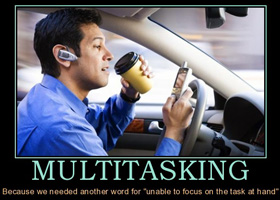 A molecular biologist compares a person driving and texting to a person in the office who is simultaneously checking emails, writing up a document, and surfing the web. He claims they are essentially doing the exact same thing. He also claims that the brain is not made to multi task, and it just doesn’t exist, as much as it is highly praised when someone claims they actually can multi task. He gives another example: You may have noticed that when you are working on something, and have music in the background, you finish work and realize the CD is finished but you can’t recall any of the songs you heard.
A molecular biologist compares a person driving and texting to a person in the office who is simultaneously checking emails, writing up a document, and surfing the web. He claims they are essentially doing the exact same thing. He also claims that the brain is not made to multi task, and it just doesn’t exist, as much as it is highly praised when someone claims they actually can multi task. He gives another example: You may have noticed that when you are working on something, and have music in the background, you finish work and realize the CD is finished but you can’t recall any of the songs you heard.
Another business coach says there is no such thing as multi tasking, but rather refers to it as task switching, where we are simply performing one task that has all our attention, while being mindless about another. Other research by him shows that people who are interrupted and have to keep switching their attention back and forth between things, take 50% more time to accomplish a task, and subsequently make the same amount of errors. An everyday life example of this: Sitting at a restaurant for lunch with a friend, you’re in deep conversation, and then you get interrupted by the waiter to take your orders. After he leaves, how many times have you completely forgotten what you were talking about? Not only do interruptions cause amnesia, claims this researcher, but they also cause delays due to the fact that the brain has to go through a four step neuron switch thing (too scientific to get into in this post).
So, given the above examples and research studies, what are your views on multi tasking in life and in the workplace?
How does multi tasking come into play if your work is in the digital social media sector where interruptions are a common thing?
What effects do you see when you try to do several things at the same time, rather than focusing on one thing at a time?
From revolutions to natural disasters, social media is playing a massive role. From initial awareness of such events, to raising awareness and funds, as well as reconnecting loved ones together, there is no doubt Twitter and Facebook are a life line to many around the world.
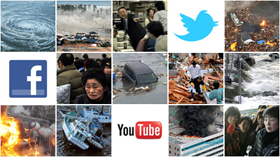
Going into details about the ‘revolutionary’ role of Social Media in the MENA region recently is not necessary. One only had to have a Twitter and Facebook account to get bombarded with updates on a minute by minute basis. From Iran to Tunisia To Egypt To Libya To Bahrain, it’s been none stop information overload regarding protests, bombardments, arrests, kinds of weapons used, what cities are taken over by who, etc… Seeing someone in a conflict zone active on either social networks came with a sigh of relief for many: Said person was still alive and tweeting! That same thing can be said for the people in Japan right now as well.
Two weeks ago, an 8.9 earthquake struck off the coast of Japan, triggering a Tsunami that tore through the country and ravaged it. Social networks have allowed people to make sure their friends and family in Japan are ok, as well as mobilizing rescue efforts through Twitter and Facebook. Charities have also been solicited using social networks to help reach aid to the affected people and areas. The earthquake in Haiti last year helped highlight the important of Social Media in times of crisis.
Social Media rushed to the rescue again, previously with Speak2Tweet during the Egyptian revolution, and now with Google Person Finder; Google often creates Person Finder sites during emergencies that allow people to leave information about their whereabouts or information about a missing person. The records of people missing are currently running into the hundreds of thousands. The Red Cross also operates similar sites that post the information of people who want to make it known that they are fine and alive, as well as allowing relatives to post information about their missing loved ones.
With all the ‘good’ that Social Media Networks can do, it leaves one to wonder:
How will countries like China, Pakistan and Bangladesh cope in times of crisis with Twitter and Facebook banned? How important do you think Twitter and Facebook are to us in this day and age of unexpected disasters?
